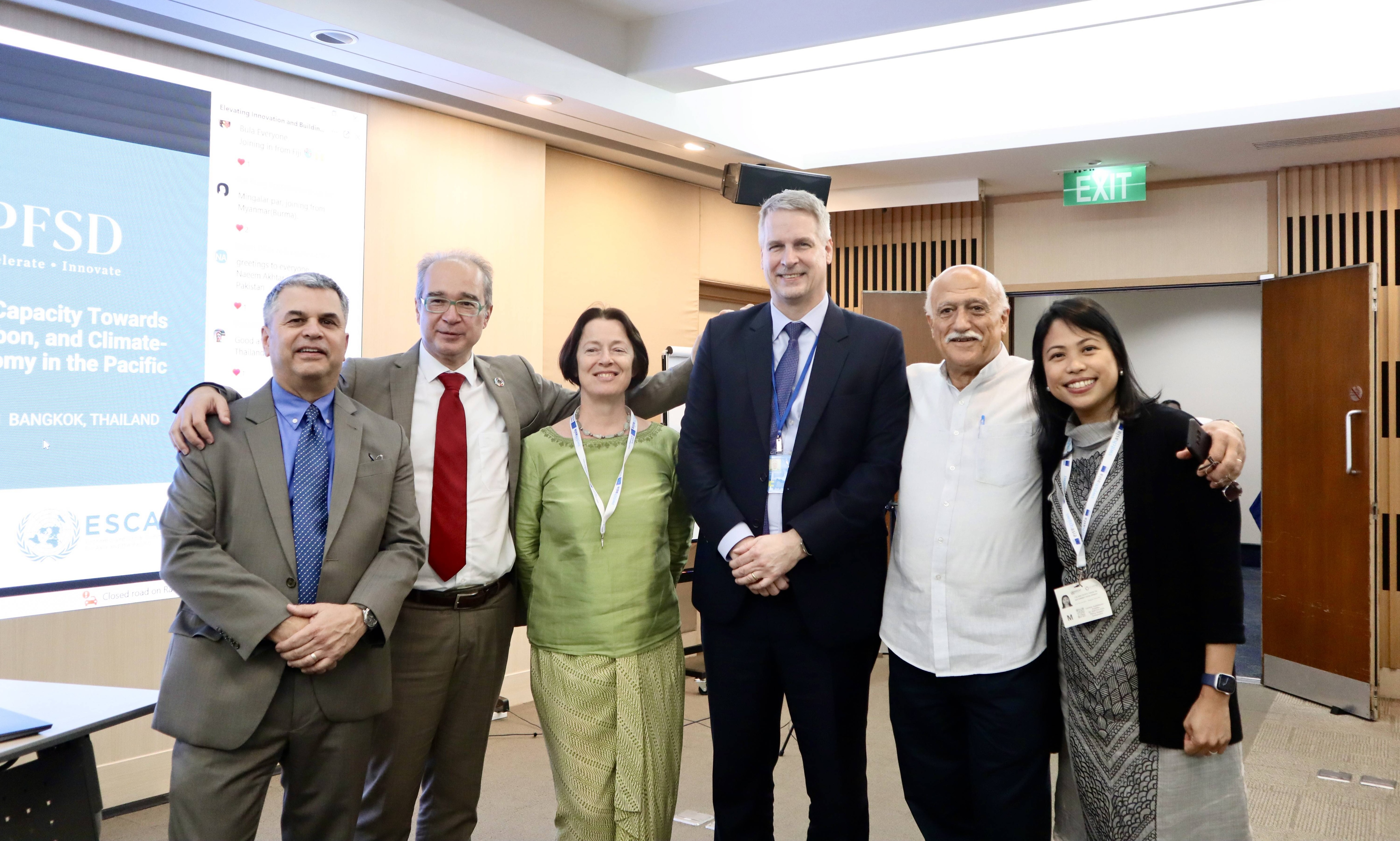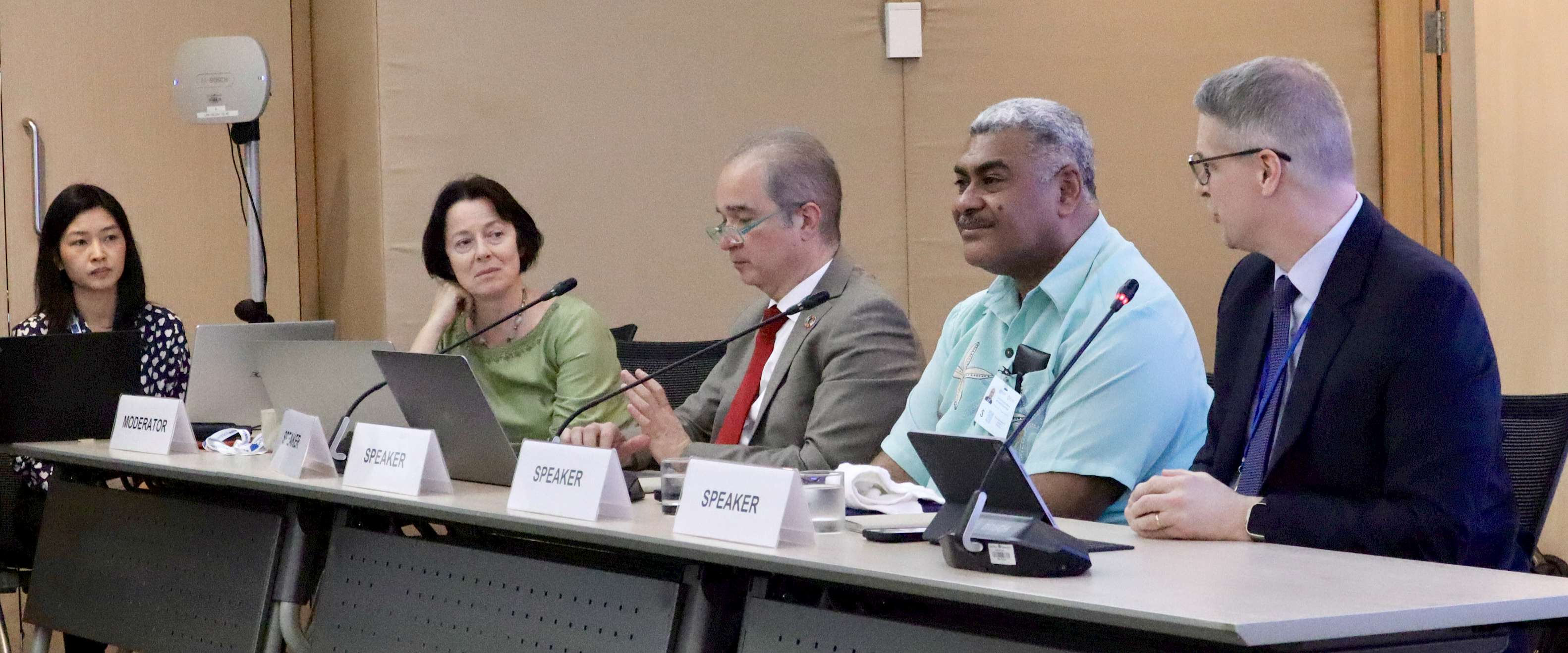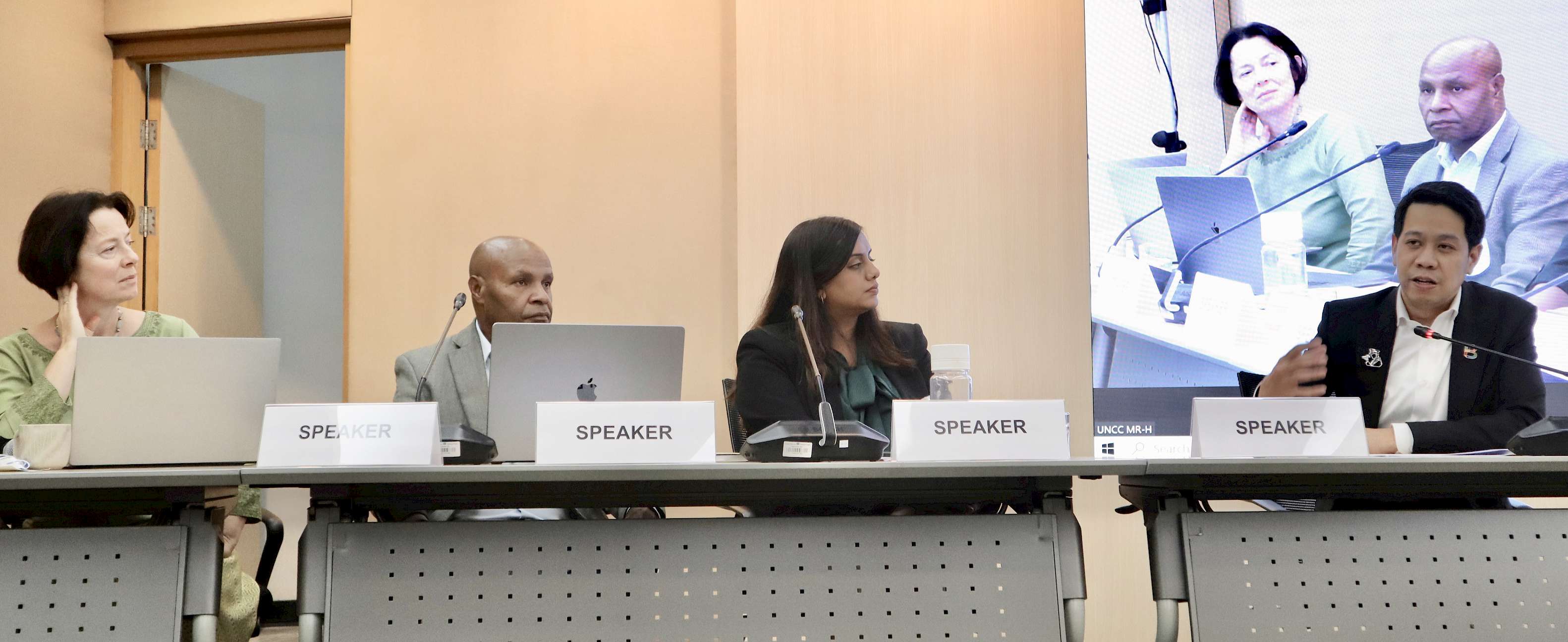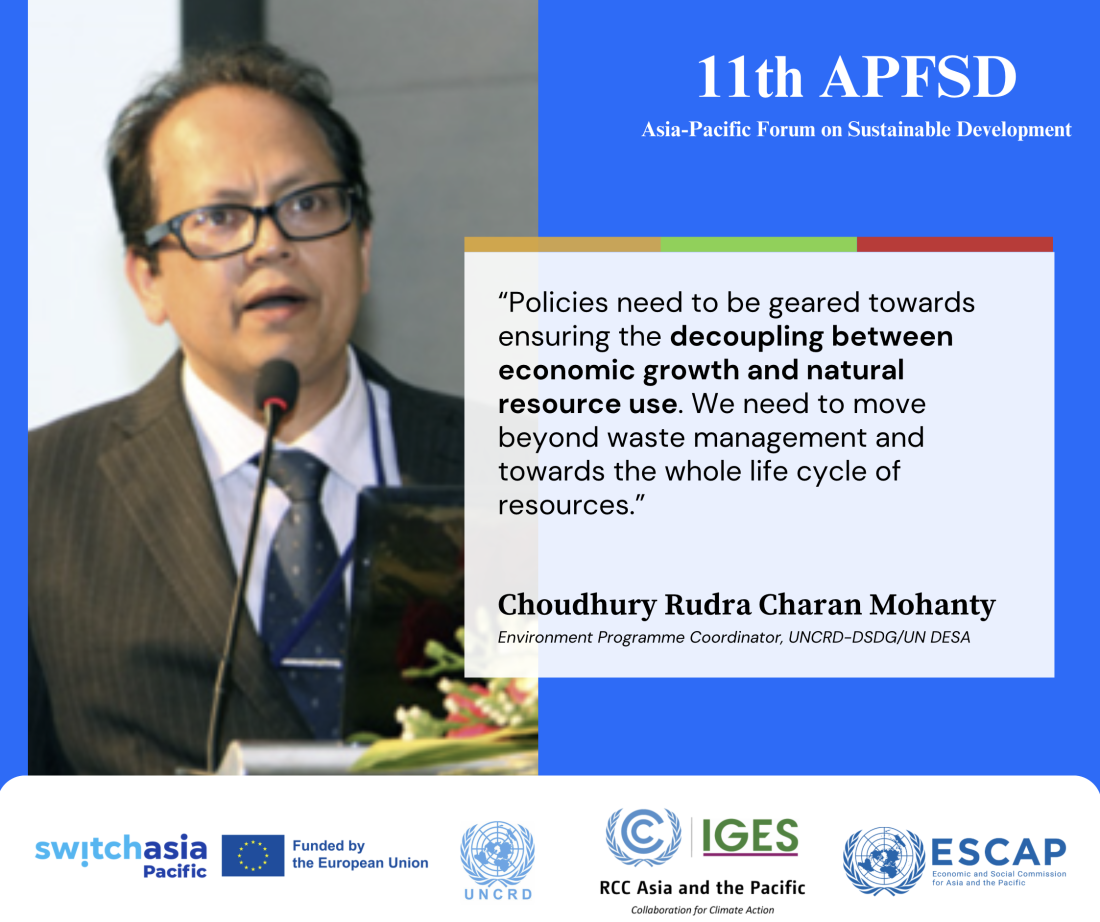
Bangkok, Thailand – On February 22, 2023, the EU SWITCH-Asia Policy Support Component together with the UNFCCC Regional Collaboration Centre for Asia and the Pacific (RCC Asia Pacific) and the United Nations Centre for Regional Development (UNCRD)- DSDG/UN DESA, organised the Side Event “Elevating Innovation and Building Capacity Towards Resource-Efficient, Circular, Low-Carbon, and Climate-Resilient Economy in the Pacific” in the context of the 11th Asia-Pacific Forum on Sustainable Development (APFSD).
The Event convened around 60 experts and participants both in-person and online to explore sustainable development pathways for the Pacific region.
The Pacific region faces unique challenges, including its geographical layout, small and dispersed populations, limited economic diversity, and vulnerability to extreme weather and climate change. Recognised by the Pacific Community as a significant threat, climate change, along with biodiversity loss and pollution, undermines the region's sustainable development, threatening its economic and social foundations. Despite these challenges, the region offers opportunities for transformative actions that mitigate the impacts of climate change and biodiversity loss. Central to this transformation is the promotion of Sustainable Consumption and Production (SCP) patterns, enhancing efficiency and fostering innovation while minimizing waste and production costs. By conserving resources, SCP contributes to long-term sustainability and prosperity, positioning itself as key driver and enabler in the transition towards a circular, climate-resilient, and sustainable Pacific economy.

Dr. Arab Hoballah, Senior Expert for the Pacific, SWITCH-Asia Policy Support Component (PSC) opened the meeting emphasizing that despite its critical role, SCP has yet to become a central priority in the Pacific, lacking comprehensive policy frameworks at regional and national levels. While various policies and activities touch upon aspects of consumption and production, a cohesive system-wide strategy to promote SCP is absent, highlighting the need for structured transformative actions, through innovations and entrepreneurship.
In his welcoming remarks, Mr. Sainivalati S. Navoti, the Chief of the SIDS Unit at the United Nations Department of Economic and Social Affairs (UNDESA), emphasized the significance of partnerships and entrepreneurship in preparing for the upcoming decade of the Small Island Developing States (SIDS) sustainability programme, set to be discussed at SIDS4 in Antigua and Barbados from May 24-27, 2024. He noted that lessons from the Pacific region could adequately inform the preparatory and negotiation processes, especially regarding innovations in supporting responsible management of blue and green resources as part of the transition to sustainability in SIDS.
Dirk Wagener, the UN Resident Coordinator for Fiji, Solomon Islands, Tonga, Tuvalu, and Vanuatu, highlighted the importance of strategic coordination and effective partnerships in accelerating the implementation of the Sustainable Development Goals (SDGs) in alignment with the 2050 Strategy for the Blue Pacific Continent, while working with small and medium-sized enterprises (SMEs) in the Pacific to enhance their resilience and resource efficiency. Mr. Wagener mentioned that programmes like the SWITCH-Asia could play a critical role in supporting the region, particularly in areas such as waste management, pollution, and circular economy practices.
Dr. Zinaida Fadeeva, Team Leader, SWITCH-Asia PSC subsequently introduced the work of the EU SWITCH-Asia programme, focusing in particular on the nexus between SCP, circular economy and climate action. She explained, byprogressively mainstreaming efficiency and responsibility, the Pacific region can achieve better natural resource management, improved access to essential resources, enhanced health and resilience, and reduced environmental impact. This is particularly significant in the context of the Pacific's structural vulnerabilities, especially among Small Island Developing States (SIDS). Transformative actions must be tailored to the diverse needs of countries in the Pacific focusing, for instance, on resource efficiency, food and tourism systems, climate resilience, digitalization, innovative financing for MSMEs, and education. Dr. Fadeeva has highlighted two technical advisories - in the area of sustainable food systems and enhancing NDCs through SCP focus - developed by the SWITCH-Asia for the Pacific region and currently undergoing consultation.
Dr. Stefanos Fotiou, Director, Office of SDGs, FAO & Director, UN Food Systems Coordination Hub presented the linkages between climate action and food systems, through the uptake of SCP and circular economy strategies. He emphasized that as per a recent FAO report, the hidden social, economic, and environmental costs linked to current food systems reach a staggering 12.7 trillion USD dollars worldwide and around 6 trillion in the Asia and Oceania region. The best way to reduce this hidden cost is to invest in SCP and Circular Economy policies and practices like phasing out harmful substances, green standards and labels for food, integrated organic farming, tackling food loss and waste, mainstreaming precision and regenerative agriculture, etc.

 The panel discussion featured insights from esteemed experts such as Mr. Choudhury Rudra Charan Mohanty, Environment Programme Coordinator, United Nations Centre for Regional Development (UNCRD)- DSDG/UN DESA, who emphasized that policies need to be geared towards ensuring the decoupling between economic growth and natural resource use, and that we need to move beyond waste management and towards the whole life cycle of resources.
The panel discussion featured insights from esteemed experts such as Mr. Choudhury Rudra Charan Mohanty, Environment Programme Coordinator, United Nations Centre for Regional Development (UNCRD)- DSDG/UN DESA, who emphasized that policies need to be geared towards ensuring the decoupling between economic growth and natural resource use, and that we need to move beyond waste management and towards the whole life cycle of resources.
Ms. Juhi Bansal, Regional Specialist, UNFCCC Regional Collaboration Centre for Asia and the Pacific (RCC Asia Pacific) further explained, while Circular Economy is gaining traction, less than 30% of Nationally Determined Contributions (NDCs) mention Circular Economy. Of these, most focus on waste management. There is a need to accelerate Circular Economy actions to achieve NDCs and the Paris Agreement goals. The UNFCCC Secretariat, UNDP and UNEP prepared a digital toolbox to support countries in building circularity into their NDCs. This toolbox could be particularly useful for the small teams within Pacific island governments.
Mr. Lawrence Duguman, First Assistant Secretary – Policy and Budget Division Department of National Planning and Monitoring Papua New Guinea (PNG) highlighted that for Papua New Guinea, there is a great need for coordination to bring local voices into the enhancement of the Nationally Determined Contributions. Papua New Guinea has prepared legislation for better management of plastic (plastic bags in particular) and food waste at household level, but more is needed. More value in waste generated at all levels must be found.
Lastly, Mr. Piyachart Isarabhakdee, CEO of Brandi & Co stressed the importance for the private sector to be future ready. Companies need to shift their priority from profit only to profit-people-planet. Instead of thinking value chain, they need to think value cycle and integrate re-use at every step.
In conclusion, there was a consensus on the multiple opportunities for transformative potential of SCP policies and strategic actions in catalyzing innovations and accelerating the transition towards a circular economy, climate change mitigation, and the achievement of SDGs targets in the Pacific. Innovations focusing on resource efficiency and community development, along with substantial support and capacity building for MSMEs, were identified as key drivers in this transformative process, addressing both local and national needs through collective actions with concerned local and regional partners in the Pacific. Ahead of the next Global SIDS conference, SIDS4, it is important to recognise the power of SCP in delivering resource-efficient, circular, low-carbon, and climate-resilient economy in the Pacific.
For more information on EU SWITCH-Asia activities in the Pacific contact:
Ms. Loraine Gatlabayan , SCP awareness raising and regional partnership building
SWITCH-Asia Policy Support Component
Learn more here.


